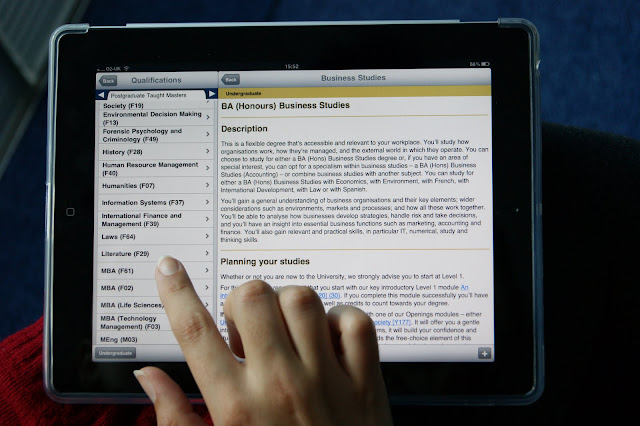
'In Business' with Peter Day on BBC Radio 4 recently included insights on higher education from the Open University Vice Chancellor Martin Bean.
Martin Beanenlightens, enthuses and convinces us of a model that puts the student at the centre of things, supported by great teaching that exploits everything online and distance learning can now offer.
Personally I always need a transcript alongside radio or TV if I am to start to recall much that is said. I offer here a partial transcript.
The Open University point of view is expressed in the first eight minutes.
PETER DAY (PD) suggests that people are complaining about education. This is 'In Business' so that angle is on the graduates that join companies.
'Almost everywhere education seems to be failing to produce what people want from it'.
Now businesses are getting much more involved we are told.
Is education a problem or a business opportunity?
'Wherever they come from and whatever they are learning what should students be taught? That’s something companies are increasingly getting involved with because they are finding it difficult to get the trained people they need'.
Various industry leaders are interviewed, but a substantial part of programme, indeed the first 8 minutes of a 30 minute piece goes to the Open University, Vice Chancellor, Martin Bean, (MB) who we are reminded comes from industry himself having led education at Microsoft.
How is the OU introduced?
One of the global pioneers in new kinds of education was the Open University set up by the British Government 43 years ago to create distance learning based on broadcasting to reach students outside lecture halls. The Internet now provides huge new opportunities for the Open University. Here’s one of the OU’s online lessons:
The History of English in 10 minutes (narrated by Clive Anderson), an iTunes podcast is offered as an example of the online learning experience.
PD: Education is in some kind of crisis: why?
MB: Institutions needs to have the student at the heart of the equation otherwise it leads to dissatisfaction either with the teaching, or worse still the outcomes when they graduate.
Are employers getting 21stcentury skills, softer skills that are really about people, about the ability to collaborate, group problem solve, the ability to communicate effectively verbally, the ability to work in teams and our model as you know is based on practice-based learning, so the beauty of embedding learning in the workplace with the Open University model means that you're actually getting the best of both worlds. I think the fact that over 80% of the FTSE 100 companies in the UK sponsor an OU student gives a pretty clear indication to me that that model is one that overcomes some of that.
PD: There is competition from the more traditional universities now?
MB: Other more traditional universities are embracing more innovative practices that we’ve been using and I think that’s fantastic, that’s what students are demanding, these are students now that view technology and access and real time interaction an absolute necessity in their life.
It’s all about embracing the technology of the day.
MB: What’s on my agenda now is to continue to leverage the web, and the personalisation of the web, to fully embrace these new tablet and mobile devices that are proliferating the world and directly link them in to our virtual learning environments, so that people can get as much out of a tablet or mobile device as they do for entertainment today they can get as much if not more using it as a Higher Education learning device.
PD: Looking at the history of technology it is often thought that the new will replace the old?
MB: We have to redefine what personal means. The web has moved from being very content centric to very people centric.
The personal side of higher education is where the magic happens.
MB: What’s interesting though is the redefinition of what 'personal' can actually be. We used to think of personal as meaning physical, having to be in the same room, what’s interesting in what has happened to the web is it has moved from being very content centric to being very people centricand enabling us to engage and collaborate in Facebook-type ways that we could not have contemplated even five years ago.
PD: Is it better?
MB: It's not fair to compare classroom or lecture with online as it is all to do with the quality of teaching.
What is effective teaching?
When we get that precious time with an academic we want is discourse, want we want is challenge.
The real question is ‘what’s fit for purpose?’
Other contributors were:
Nick Wilson
Managing director, HP UK
Rob Williams
Principal lecturer, University of the West of England
Ralph Mainard
Deputy master, Dulwich College
Joe Spence
Master of Dulwich College
Jim O’Neill
Chairman of Goldman Sachs Asset Management
Kunal Bahl
Founder of Indian coupon website Snapdeal
Krishnan Ganesh
Founder Tutorvista
Eric Schmidt
Chairman, Google
REFERENCE
Day, P (2011) In Business. TX 5 JAN & 9 Jan 2012 http://www.bbc.co.uk/programmes/b018xwtc (Accessed 10 Jan 2012)